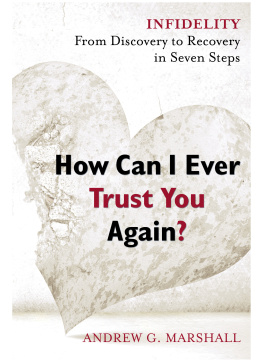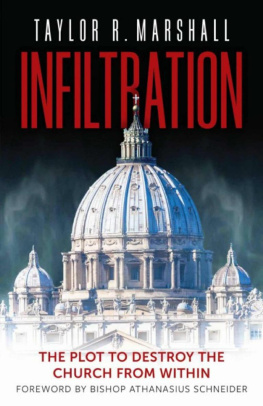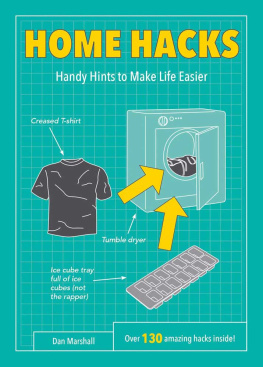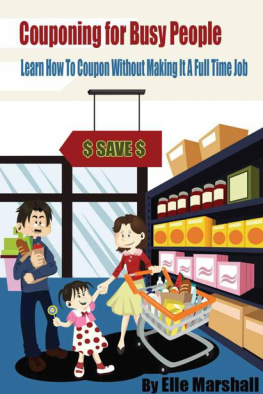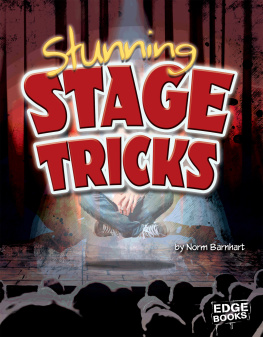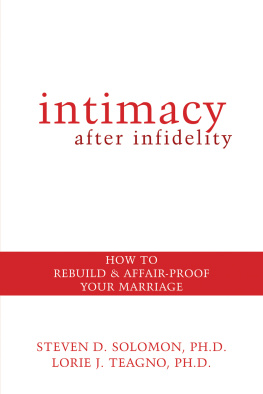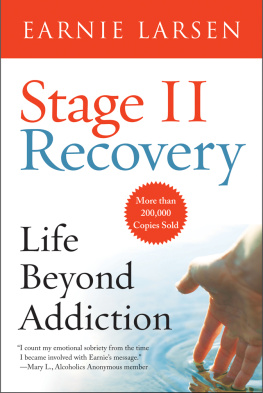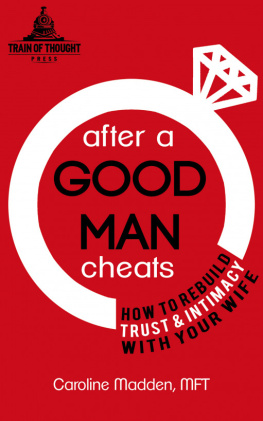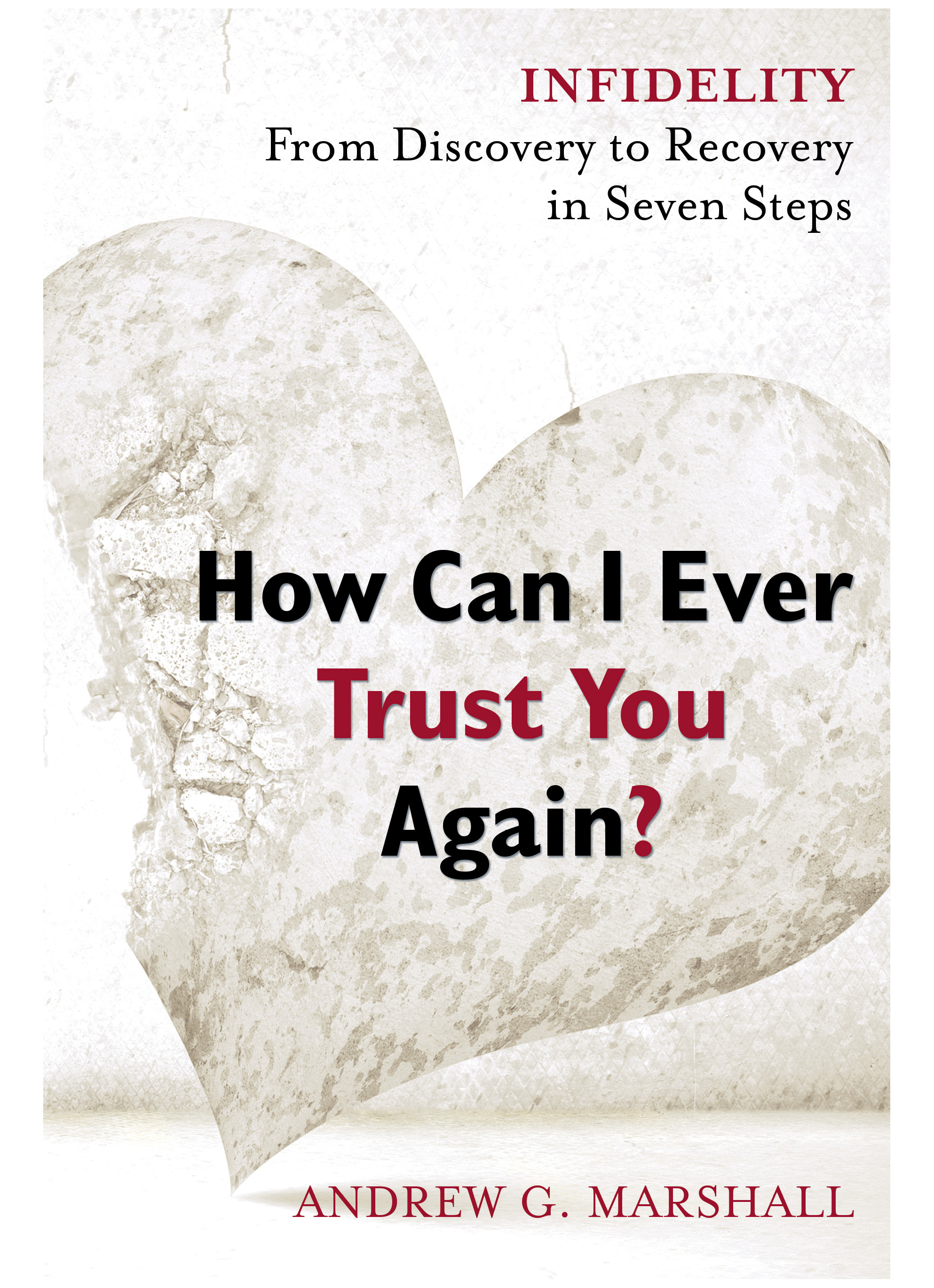How Can I Ever Trust You Again?
INFIDELITY
From Discovery to Recovery in Seven Steps
ANDREW G. MARSHALL
MARSHALL METHOD
PUBLISHING
The case histories in this book are based on couples with whom I have worked in my marital therapy practice (their identities have been changed to protect confidentiality and sometimes two or three cases have been merged together) and individuals who wrote to my website.
If readers have a medical complaint, it is important that they consult their doctor.
A Marshall Method Publishing
London Florida
www.marshallmethodpublishing.com
Library of Congress Cataloging-in-Publication Date is available through the Library of Congress.
ISBN: 978-0-9929-7185-4 (Paperback)
ISBN: 978-0-9929-7186-1 (ePub)
Copyright 2016 by Andrew G. Marshall
The right of Andrew G. Marshall to be identified as author of this Work has been asserted by him in accordance with sections 77 and 78 of the Copyright, Designs and Patents Act 1988
All rights reserved. No part of this publication may be reproduced, stored in retrieval system, copied in any form or by any means, electronic, mechanical, photocopying, recording or otherwise transmitted without written permission from the publisher. You must not circulate this book in any format.
Cover & interior design: Gary A. Rosenberg | www.thebookcouple.com
Printed in the United States of America
10 9 8 7 6 5 4 3 2 1
ePub created by Dawn Von Strolley Grove
To my agent, Rachel Calder
Thank you for all your advice, support and understanding
Contents
Almost one in five couples who come to my marital counseling office are dealing with the fallout from an affair. In fact, it is the fourth most common reason for seeking my help. According to Kinseys groundbreaking research in forties and fifties America, 26 percent of married women and 50 percent of married men had cheated on their spouses; while the British Sexual Fantasy Research Project found that 55 percent of the adult population have committed adultery at some point. Subsequent research has produced similar findings. When you throw in all the couples who have been living together or dating, the numbers are even greater. At times, it feels like a tidal wave of misery, betrayal, and hurt is flooding my therapy office.
However, it is not all bad news. Infidelity might be a terrible crisis but the Chinese symbol for crisis is made up of two words: danger and opportunity. If you have bought this book after discovering your partners adultery or because your own adultery has been discovered and your relationship is hanging in the balance, you will be only too aware of the danger. My aim is to open your eyes to the opportunity. Infidelity turns life upside down and makes you question everything. The fear that it could all happen again shines a spotlight on all the murky corners of your relationship and provides the impetus to change. Sometimes clients moan: I just want my old life back. Thats not possible, but if you seize on the opportunity part of crisis, you can find a deeper, more durable, and ultimately better relationship.
I have tried to keep the tone of this book compassionate. (There are exceptions, but few people set out to have an affair.) It is mainly aimed at the Discoverers of adulterybecause they are generally the most hurt and most in need of answersbut each chapter has a box addressed specifically to the Discovered. My hope is that couples will share the book and find that the exercises provide them with a bridge to understanding each other better. If you are the third party in the affair triangle, you will find less of a direct benefit. However, I hope this book will provide an insight into the dynamics of adultery and, if your affair has ended, to help in the healing process.
In writing How Can I Ever Trust You Again? , I have drawn on clients from over thirty years of marital therapy as well as interviews with people not in counseling and questionnaires filled in by visitors to my website. (This research was publicized in articles about infidelity in several leading UK newspapers and by the Huffington Post the Internet newspaper. In total, fifteen hundred questionnaires were submitted from all over the world. Sixty-eight percent were completed by people who had discovered their partners infidelity, 32 percent by those who had been unfaithfuland of these just over half had confessed to their partner about the affair.) To protect confidentiality, I have blended sometimes two or three cases together. My thanks, as always, to everyone who has shared their experiences. I hope it helped make sense of what happened and provided the building blocks for a brighter future.
How to use this book:
The main part of each chapter is written for someone who has discovered their partners infidelity.
At the end of each chapter, there is a box for people who have been unfaithful. This is followed by a section about the particular lesson from this stage in the journey and a summary of the whole chapter.
It is better if both you and your partner read the whole book. However, I have designed the program so that it will work if your partner only reads his or her section.
Dont worry if your partner distrusts self-help books, or is uncertain about the future; this program will help you cope better, think before acting, and become more balanced. This, in turn, will have a positive knock-on effect on your partners behavior and enable the two of you to cooperate better.
Read the whole program, so that you have a sense of the overall journey, and then concentrate on your particular stage.
When you are in crisis, depressed, or under stress, turn back to the previous chapter. It could be that you have missed some important piece of healing and need to return and complete that stage.
Take a deep breath. Keep calm. Things will get better.
Stage One:
Shock and Disbelief
Good relationships are built on three building blocks: trust, honesty, and compassion. We do not need a minute-by-minute breakdown of where our beloved has been or what she or he has done because we trust them. If there is a problem, we expect our partner to be honest and own up. We hope that the people we love have our best interests at heart and that, when we stumble, they will be compassionate. And the wonderful thing about love is that we are prepared to offer the same in return. Under the protection of a good relationshipand trust, honesty, and compassiona couple will not only thrive but also be ready to take on the world. Unfortunately, because these building blocks are so fundamental, we often take them for granted. We seldom even mention trust, honesty, and compassion in day-to-day conversation. They are just there, like food, water, and shelter. It is only when our partner has been unfaithful, violated our sense of emotional intimacy, and destroyed our sense of safety, that we begin to realize how precarious trust, honesty, and compassion can be.
If your partner has been unfaithful or you suspect infidelityor alternatively it is you who have strayedyou will be only too aware of how difficult it is to rebuild a broken relationship. At this point, you will probably fear the damage is irreparable. Perhaps you have neither the desire nor the inclination to try to rebuild the relationship. Trust is at an all-time low and there is probably more anger than compassion. Worst of all, you doubt that you will ever be able to trust your partner, or be trusted, again. However, my message is that not only is it possible to recover from infidelity but it is also possible to come out the other side with a stronger relationship. You will probably feel skeptical, but you will have to take it on trust. Theres that word again.

